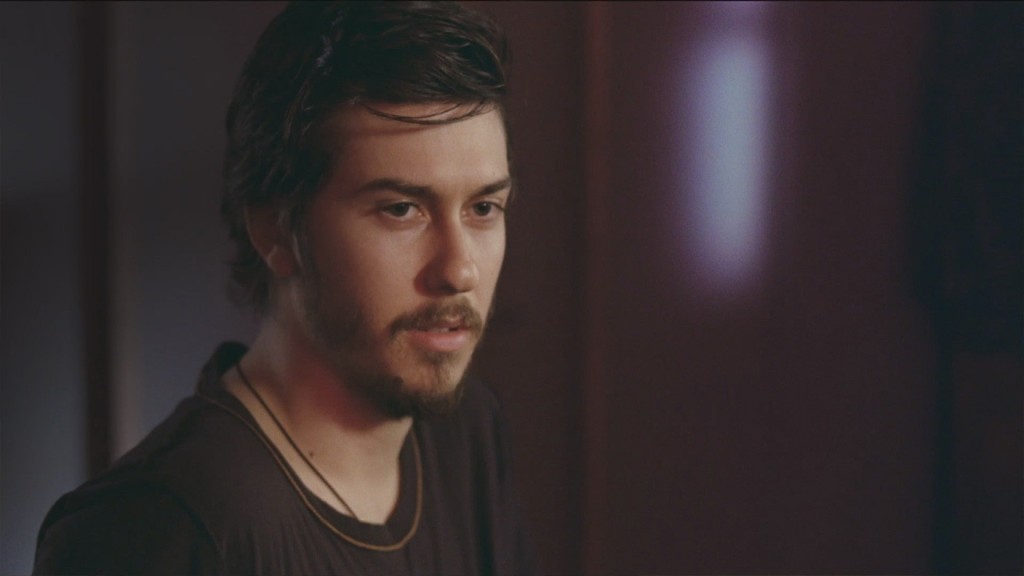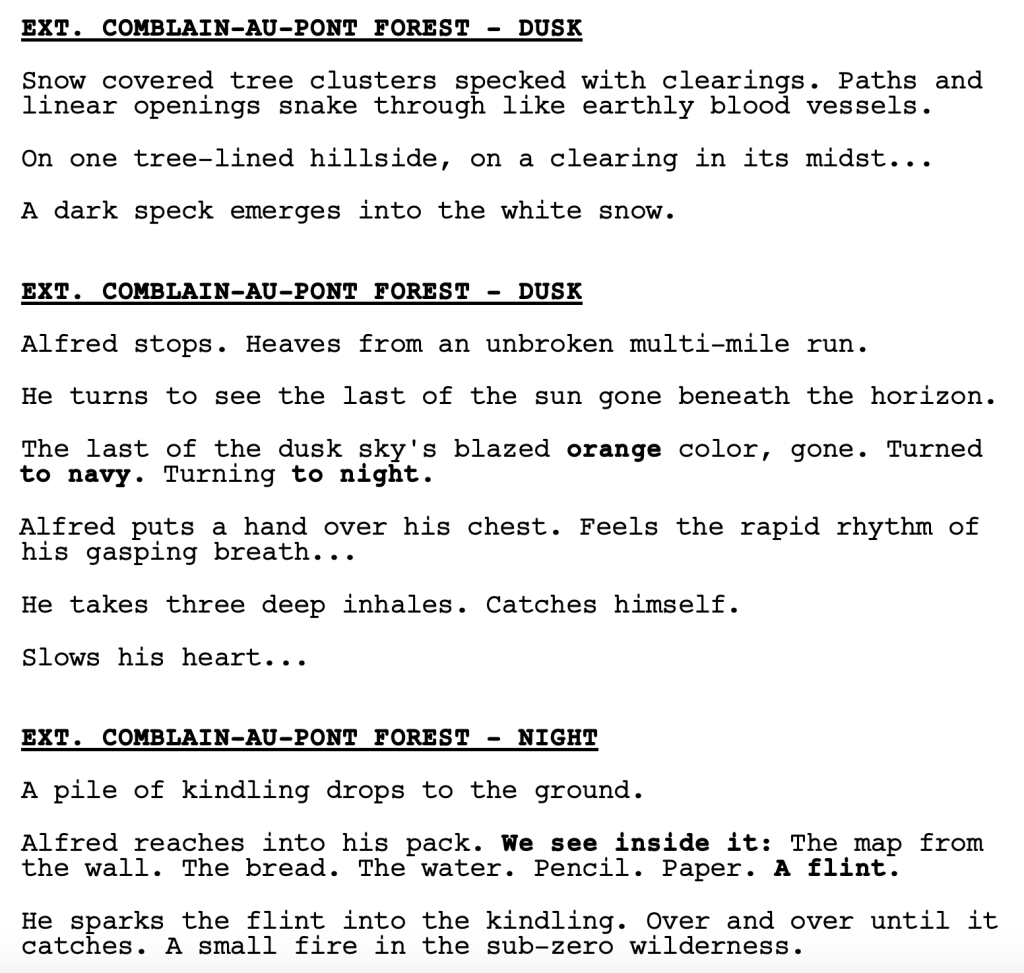With the arrival of today’s spec, we must ask the question, is the real-time war film going to become its own genre??
Genre: Action/War
Premise: Near the tail end of World War 2, an American POW escapes certain death at a concentration camp and makes a run for the southern Allied border, but is pursued by a determined Nazi soldier.
About: Today’s screenplay comes from an interesting writer named Henry Dunham. You might recognize the name because I reviewed a previous script of his called, “Militia,” which was a clever take on the contained thriller genre where a rural militia are forced into a local warehouse to figure out who’s responsible for a rapidly growing series of domestic terrorist attacks. The film was too dark for most to handle but I never forgot the writer. Well, he’s back and he’s teamed up with Thunder Road, who are responsible for John Wick, Sicario, and The Town. It looks like Dunham will be directing his script as well.
Writer: Henry Dunham
Details: 96 pages
This is one of the best sub-genres to get into right now. The fast-paced (or high-concept) simplistic major war sub-genre. We just saw this with 1917. We saw it with Black List script, “Helldiver,” about American and Japanese war pilots stuck in the middle of the ocean on one of their shot down planes. We saw it with the number one Black List script of 2017, Ruin, about a former SS Captain and a Jewish woman who travel through war-torn Germany to find and kill a Nazi officer.
Not many possess the skill required to create rich nuanced screenplays about complicated wars. But that’s okay. You can still come up with a simple easy-to-understand concept that plays within World War 1 or World War 2 and knock our socks off. And that’s what we get today.
It’s winter. American soldier Alfred Bergen is in some sort of Danish concentration camp near the end of World War 2. When we meet him, he’s being rounded up with the rest of his POWs by a hurried German army. They’re ditching this camp, and therefore everyone needs to be killed. They take the Americans, line them up, and shoot them all dead.
Alfred wakes up in a mass grave. He survived somehow. And, as luck would have it, the Germans are gone. So he squeezes out, grabs some food in one of the buildings, and finds a map on the wall. 50 miles down is the Allied line, in Luxembourg. If he can get there, he’s golden.
But first Alfred must grab warmer clothes and dog tags from his dead friends. While he’s doing this, new Germans roll up. Alfred makes a run for it into the endless Southern forest, but a perceptive Nazi soldier named Otto Ziegler notices the footsteps in the snow and goes after him. Alfred has a few hours head start but Otto has a horse.
Alfred survives the night but then runs into another German unit. Germans in front, Germans behind! Alfred discovers a nearby clearing where an Allied unit has been slaughtered. So he sneaks over and plays dead amongst the soldiers. Except there’s a problem. The clearing isn’t land. It’s a frozen over lake. So when Otto discovers him and starts shooting, it’s cracking the ice. Alfred goes under, swims underneath the ice to the southern shore, and is back on the run.
He eventually makes it to a farm where a young Danish woman is living. She doesn’t believe he’s who he says he is and tells him to leave. He explains if he does that, the evil Nazi following him will surely come here and kill her for aiding him. Their only shot at surviving is to stand their ground in the house and kill Otto. So they prep. Otto will be here soon and they need to be ready. Little do they know, this mano a mano battle is far from over.
So here’s the thing.
When you’re writing something that’s action based – something that doesn’t have a lot of dialogue, you need to write in a stripped-down minimal format that’s as fast to read as possible. The reason for this is that readers like dialogue. Why do they like dialogue? Cause they’re big fans of the artistry of conversation? No. Because dialogue reads three times as fast as action.
So when all you have is action, the read is much longer. Which means the reader hates you. Not literally but kind of, yes, they do. Your script might be your baby but to them it’s time taken. You are taking time from them. Readers are fine with this when you respect their time. But if you try and write some all action all description script and don’t keep the action lines short, the reader will want to kill you.
I don’t think there’s a single paragraph in “Perdition” that’s over two lines. And while that might seem like overkill, that’s how you should be thinking when you have minimal dialogue.
Speaking of dialogue, our first scene with dialogue doesn’t happen until page 35. It took me a moment to figure it out but I realized that this scene was pulling double-duty. It wasn’t just providing a conflict-filled scenario between our hero and a skeptical home-owner. It was answering a few big questions we had.
The first one was why Alfred was so obsessed with these freaking dog-tags he was carrying around. You’d think they were newborn puppies he was so protective of them. The second was why the heck is this man chasing you? Doesn’t he have better things to do than follow a random American trying to find safety?
I bring this up because this is one of the most common challenges you’ll face in screenwriting. You’re trying to make a scene look like it’s only there for entertainment value when, in reality, you’re using it to slip in relevant exposition. The writers who do the latter but make it look like the former are the ones who are usually the most successful.
Luckily for Dunham, this is a naturally entertaining scenario. You’ve just snuck into someone’s house. They found you. They have a gun trained on you. They know they must doubt everything in order to survive. So when the woman, Louise, starts interrogating him, it’s only natural that she asks him the same questions we’ve been wanting answers for. Why the heck do you care about a bunch of pieces of metal? Why would some psychopathic soldier follow you all the way across the country? Hence, we don’t realize that exposition is being given. But that’s the catch. You need to create scenarios that hide exposition within entertainment. As long as we’re more focused on the tension or the intrigue of the moment, we won’t catch your sleight-of-hand exposition drops.
So what rating do I give this script?
I believe when a script poses a premise to the audience, it must deliver on two promises. The first one is to deliver on the promise of the premise. If you tell us your movie is about dinosaurs on an island, don’t give us a political story about land rights.
The second promise is to deliver something above and beyond what we expect. If you only give us what we’ve imagined in our heads, why did we need you? We could’ve imagined that ourselves. A professional writer must go above and beyond the call to give us MORE. More could mean a major plot twist we weren’t expecting or it could mean amazing characters that were authentic and interesting and made us feel something.
“Perdition” definitely delivered on the first. And it just barely delivered on the second. There were enough strong moments that I found myself excitedly turning the pages. I loved, for example, that our hero finds safety in a sea of dead soldiers. But that the safety is an illusion. He’s on a frozen lake. And with every gun shot that comes his way, that ice is cracking. Stuff like that put this over the ‘worth the read’ edge for me into ‘double’ territory.
I also like that the ending here is NOT what you’d expect at all. AT ALL. Yet it’s somehow immensely satisfying. I don’t want to spoil it but it’s got “movie moment” written all over it.
I could see this being marketed as the WW2 version of 1917 and making a lot of money.
[ ] What the hell did I just read?
[ ] wasn’t for me
[xx] worth the read
[ ] impressive
[ ] genius
What I learned: We had three different stories this week. A horror movie. A heist film. And a World War 2 flick. Coincidentally, all three of them had soldier stories. I used to think anything involving soldiers (especially backstory) was cliche. Everyone uses it. But I came around to it when I realized there are no higher stakes than war. War is where every moment is life or death. So if you can tap into the most extreme component of humanity – survival – why wouldn’t you? You still have to come up with scenarios that feel specific and authentic for your soldier story to resonate. But when it’s done well, it most certainly feels bigger than your average character drama.



